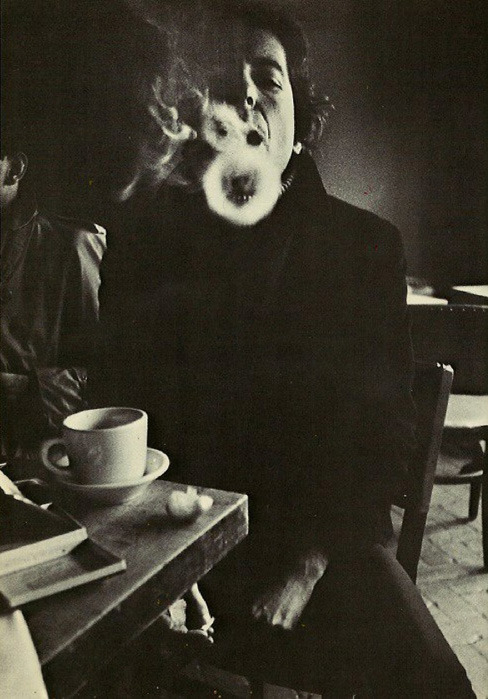domingo, 31 de julho de 2011
O que há para compreender
- Quando cresceres compreendes
recordo-me de perguntar
- O que há para compreender?
António Lobo Antunes, Sôbolos Rios Que Vão, D. Quixote, 2010.
Às vezes a ler um texto pensas: é isto, é isto mesmo, woo oooo!
sábado, 30 de julho de 2011
whose warmest heart recoiled at war:
a conscientious object-or
his wellbelovéd colonel(trig
westpointer most succinctly bred)
took erring Olaf soon in hand;
but--though an host of overjoyed
noncoms(first knocking on the head
him)do through icy waters roll
that helplessness which others stroke
with brushes recently employed
anent this muddy toiletbowl,
while kindred intellects evoke
allegiance per blunt instruments--
Olaf(being to all intents
a corpse and wanting any rag
upon what God unto him gave)
responds,without getting annoyed
"I will not kiss your fucking flag"
straightway the silver bird looked grave
(departing hurriedly to shave)
but--though all kinds of officers
(a yearning nation's blueeyed pride)
their passive prey did kick and curse
until for wear their clarion
voices and boots were much the worse,
and egged the firstclassprivates on
his rectum wickedly to tease
by means of skilfully applied
bayonets roasted hot with heat--
Olaf(upon what were once knees)
does almost ceaselessly repeat
"there is some shit I will not eat"
our president,being of which
assertions duly notified
threw the yellowsonofabitch
into a dungeon,where he died
Christ(of His mercy infinite)
i pray to see;and Olaf,too
preponderatingly because
unless statistics lie he was
more brave than me:more blond than you.
e.e. cummings, Selected Poems, Richard S. Kennedy (ed.), Liveright, 2007.
5
ducking always the touch of must and shall,
whose slippery body is Death's littlest pal,
skilled in quick softness. Unspontaneous. cute.
the signal perfume of whose unrepute
focusses in the sweet slow animal
bottomless eyes importantly banal,
Kitty. a whore. Sixteen
you corking brute
amused from time to time by clever drolls
fearsomely who do keep their sunday flower.
The babybreasted broad "kitty" twice eight
—beer nothing,the lady'll have a whiskey-sour—
whose least amazing smile is the most great
common divisor of unequal souls.
sexta-feira, 29 de julho de 2011
One can feel so much and no more.
quinta-feira, 28 de julho de 2011
Qui, quae, quod
Neste momento os bácoros da recente ninhada, iludidos pelo seu vulto, alvoroçaram-se do chiqueiro e desataram na partitura: cué! cué!
O sustenido dos leitões acordou-lhe na memória a forma feminina do relativo. Qui, quae, quod. E gozou, grato à perdurante formação latina o sentido poético da onomatopeia. Quem poderá garantir que aquela voz elementar não tivesse sido copiada pelo avô troglodita na selva romana onde os cerdos tinham suas recolhas naturais e soltavam grunhidos espontâneos?
Aquilino Ribeiro, O Professor intemerato e a Gaitinha do Capador
O pélago coalhado de algas e nenúfares em flor do grande padre Vieira
Certa manhã, que o ilustre professor havia terminado o petit déjeuner... Esta expressão dum hábito civilizado, irradiante como tanto pequeno nada que diz respeito à língua francesa, agastava-o no seu orgulho nacional. Mas ainda não topara substituto idóneo na língua que considerava, ele e os mestres filólogos, como a mais rica do Universo, salvo as hindus, intrincadas como a selva e a alma asiática. Pois certa manhã que já havia tomado o leitinho, no português portuguesíssimo da tia Alexandrina, e se preparava para singrar, de sonda na mão, no pélago coalhado de algas e nenúfares em flor do grande padre Vieira, deu fé que batiam à porta.
Aquilino Ribeiro, O Professor intemerato e a Gaitinha do Capador
4
defunct
who used to
ride a watersmooth-silver
stallion
and break onetwothreefourfive pigeonsjustlikethat
Jesus
he was a handsome man
and what i want to know is
how do you like your blueeyed boy
Mister Death
e.e. cummings, Selected Poems, Richard S. Kennedy (ed.), Liveright, 2007.
5
of memory comes my heart singing like
an idiot whispering like drunken man
who(at a certain corner suddenly)meets
the tall policeman of my mind.
awake
being not asleep elsewhere our dreams began
which now are folded:but the year completes
his life as a forgotten prisoner
-"Ici?"-"Ah non mon chéri;il fait trop froid"-
they are gone:along these gardens moves a wind bringing
rain and leaves filling the air with fear
and sweetness....pauses. (Halfwhispering....halfsinging
stirs the always smiling chevaux de bois)
when you were in Paris we met here
e.e. cummings, Selected Poems, Richard S. Kennedy (ed.), Liveright, 2007.
quarta-feira, 27 de julho de 2011
Parte do meu manifesto
you shall above all things be glad and young
For if you're young,whatever life you wear
it will become you;and if you are glad
whatever's living will yourself become.
Girlboys may nothing more than boygirls need:
i can entirely her only love
whose any mystery makes every man's
flesh put space on;and his mind take off time
that you should ever think,may god forbid
and (in his mercy) your true lover spare:
for that way knowledge lies,the foetal grave
called progress,and negation's dead undoom.
I'd rather learn from one bird how to sing
than teach ten thousand stars how not to dance
e.e. cummings, Selected Poems, Richard S. Kennedy (ed.), Liveright, 2007.
terça-feira, 26 de julho de 2011
A Verb, and Is
e.e. cummings, The Enormous Room, cap.9
Às vezes lembro-me deste passo do The Enormous Room. Nele e.e. cummings fala de um momento que corresponde a uma identificação perfeita com algumas coisas. Isto acontece com muito poucas coisas. Os nossos círculos são sempre restrictos. Mesmo os da nossa memória, a que fixa o reduto último dessa outra coisa que é o tudo-o-que-tenho-trago-comigo. Há depois o que guardamos sem saber que guardámos. O passageiro indesejado que se aloja no instinto, no subconsciente. Talvez. Mas cummings não estava a falar disto. Eu é que estou a falar disso. O que é tão fantástico neste passo de cummings é o facto de ele dizer que existem coisas em que não podemos acreditar porque não deixamos de as sentir (hence Borges, quando dizia que a poesia era uma coisa anterior à inteligência) e o facto de para cummings a identificação perfeita com uma coisa ser expressa por um verbo. Pertencer à acção. Penso que Wilde falou disto de outro modo, colateralmente, em "The Critic as an Artist", quando escreveu:
For out of ourselves we can never pass, nor can there be in creation what in the creator was not. Nay, I would say that the more objective a creation appears to be, the more subjective it really is. Shakespeare might have met Rosencratz and Guildenstern in the white streets of London, or seen the servicemen of rival houses bite their thumbs at each other in the open square; but Hamlet came out of his soul, and Romeo out of his passion. They were elements of his nature to which he gave visible form, impulses that stirred so strongly within him that he had, as it were perforce, to suffer them to realize their energy (…)
Oscar Wilde, The Decay of Lying and Other Essays, Penguin Books, 2010.
Disto se falou no dia d'Ela
D. H. Lawrence, Lady Chatterley's Lover, Penguin Books, 1960.
Pobre Calisto
Se ele soubesse que hoje já nem para os comediantes há subsídios...
"- Sr. presidente. Em Grécia e Roma as festas anuais eram solenizadas com espectáculos. Os cidadãos timbravam em se despenderem aporfiadamente para o maior realce das representações teatrais. Na Grécia, o arconte epónimo, a cargo de quem o Estado delegava as despesas das representações, esmava o dispêndio de cada uma em dois talentos (...). Este dispêndio faziam-no espontâneamente os ricos; e, se era o tesouro nacional que adiantava as despesas, a concorrência convidava pelo preço diminutíssimo do theorikon ou entrada, que correspondia ao vintém da nossa moeda. E de Péricles em diante, sr. presidente, tomou o Estado à sua conta o pagamento das entradas dos pobres. Entre os Romanos, eram os poderosos, como Lépido e Pompeu, e, ao diante, os imperadores, que sustentavam do seu bolsinho as representações teatrais. (...) Eu tenho o desgosto de ter nascido num país em que o mestre-escola ganha cento e noventa réis por dia, e as cantarinas, segundo me dizem, ganham trinta e quarenta moedas por noite. Eu sou de um país, sr. presidente, em que se pede ao povo o subsídio literário para pagar com ele as tramóias da Lucrécia Bórgia. Eu sou de um país pobríssimo em que a veia da Nação exangue sofre cada ano a sangria de algumas dúzias de contos para sustentar comediantes, farsistas, funâmbulos e dançarinas impudicas! Sr. presidente, V. Exª sorriu-se, vejo que a Câmara toda está sorrindo, e eu ouso dizer a V. Exª e aos meus colegas, como o poeta mantuano: sunt lacrimae rerum."
Camilo Castelo Branco, A queda dum anjo, Livros Unibolso, Lisboa.



